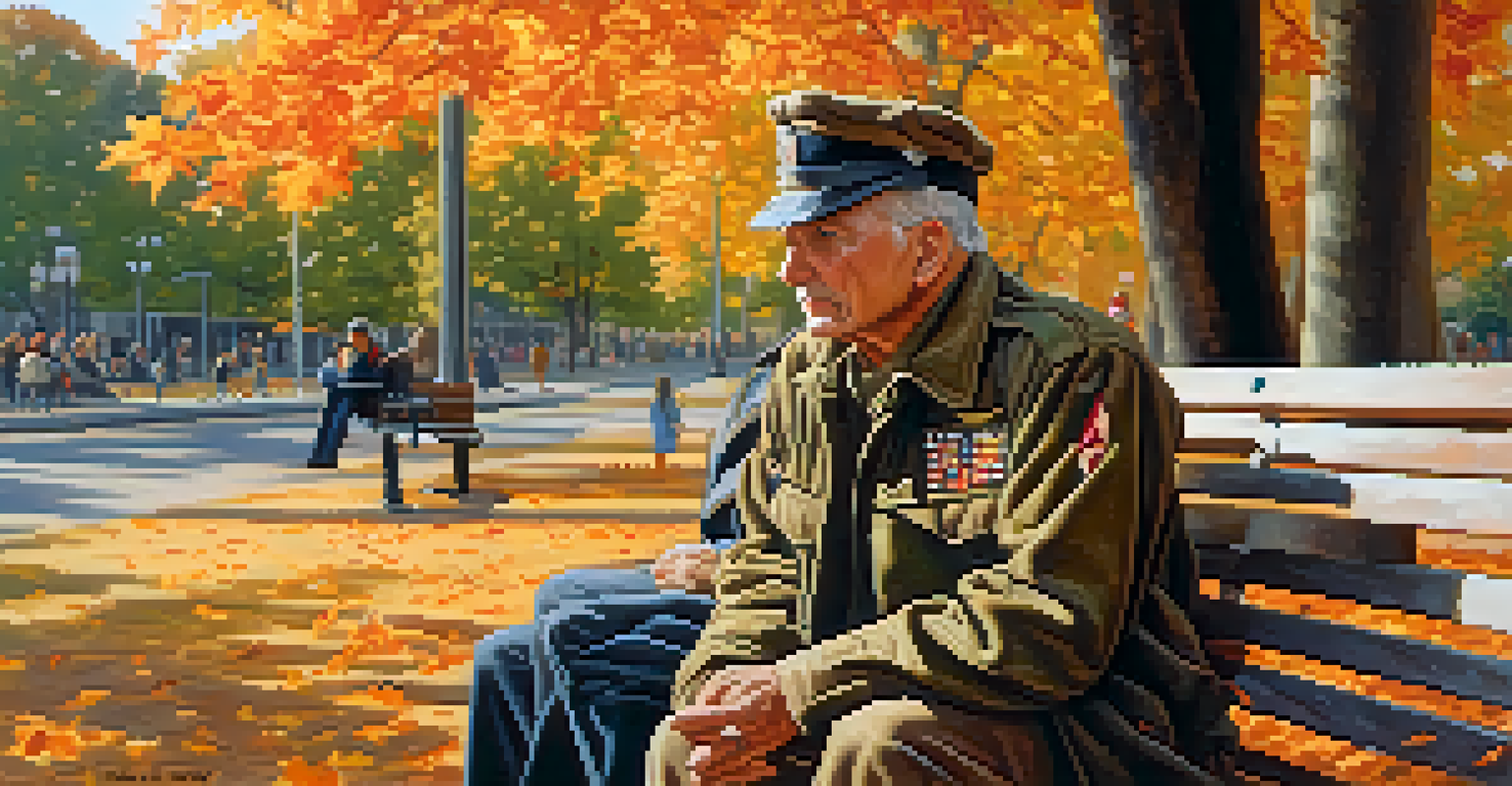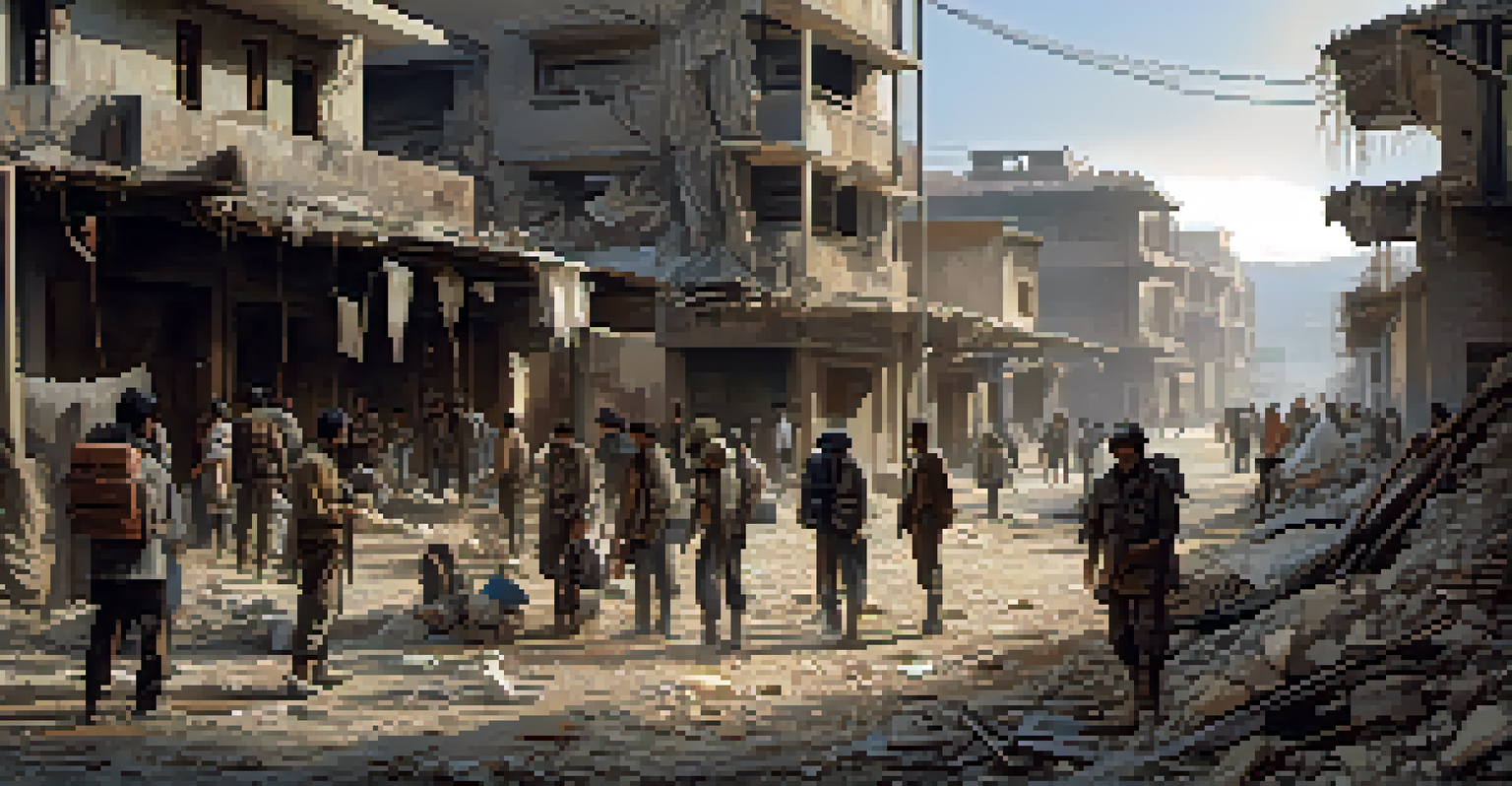The Influence of Hollywood on Public Perceptions of War

The Role of Film in Shaping War Narratives
Movies have long served as a lens through which we view war, often shaping public perception in significant ways. From classic films like 'Saving Private Ryan' to contemporary blockbusters, these narratives can evoke strong emotions and influence opinions about military conflict. They present not just the chaos of battle, but also heroism, sacrifice, and the moral complexities of war.
The greatest war movie ever made is 'Apocalypse Now'. It is a film about the Vietnam War that we are still trying to understand.
Through storytelling, filmmakers can humanize soldiers and give a face to the statistics often found in news reports. This emotional connection can lead to greater empathy among viewers, which might not exist without the art of cinema. As such, films can serve as powerful tools for both reflecting and shaping societal attitudes toward military engagement.
Moreover, the portrayal of war in films often comes with a sense of glamour or heroism, which can gloss over the harsh realities faced by those involved. This selective representation can skew public perception, leading to a dichotomy between the idealized version of war and the often grim reality.
Documentaries: A Different Perspective on War
Unlike fictional films, documentaries aim to present a more factual account of war. These films delve deeper into the experiences of soldiers and civilians, offering a raw look at the impact of conflict. Documentaries like 'Restrepo' and 'The Fog of War' provide viewers with firsthand accounts, allowing them to grapple with the complexities of war in a more grounded way.

These narratives challenge the glamorization often seen in Hollywood films, presenting a more nuanced understanding of the consequences of military actions. By focusing on personal stories, documentaries can shift public perceptions, fostering a greater understanding of the human cost of war. This shift can be vital in shaping public discourse around military interventions.
Films Shape War Perceptions
Movies often influence public opinion about war by presenting emotional narratives that highlight heroism and sacrifice.
Additionally, documentaries often spark conversations about policies and decisions made by governments, encouraging audiences to think critically about the rationale behind military actions. This can lead to a more informed public, capable of engaging in dialogues about war and its implications.
The Impact of War Movies on Recruitment
Hollywood's portrayal of war can inadvertently influence military recruitment. Films that depict soldiers as heroic figures embarking on noble missions can inspire young people to join the armed forces. The excitement and camaraderie portrayed on screen often create a romanticized view of military life, which might not reflect reality.
Documentaries are the most powerful weapon against ignorance.
Recruitment campaigns often leverage popular films to connect with potential recruits, using familiar imagery and themes to resonate with their experiences or aspirations. This can lead to an increase in enlistment, especially among those who are drawn to the ideals of bravery and adventure presented in these films.
However, this recruitment strategy raises ethical questions about the responsibilities of filmmakers and the military. Should the entertainment industry be held accountable for the narratives it promotes, particularly when they can lead to life-altering decisions for young individuals?
The Role of Television in War Coverage
Television has played a crucial role in shaping public perceptions of war, especially with the rise of 24-hour news cycles. News programs often showcase live coverage from war zones, bringing the realities of conflict into living rooms across the nation. This immediacy can create a sense of urgency and a more visceral understanding of ongoing military operations.
However, the way these stories are presented can also skew perceptions. Sensationalized reporting may focus more on dramatic visuals than on comprehensive analysis, leading to a superficial understanding of complex issues. This can result in public opinion being shaped more by imagery than by factual information.
Documentaries Offer Reality
Unlike fictional films, documentaries provide a raw, factual account of war, emphasizing the personal stories behind military conflicts.
Moreover, the portrayal of soldiers on television can influence how the public views their sacrifices. When narratives focus on heroism and valor, they can overshadow discussions about veteran care and the psychological impacts of war, which are equally important topics that deserve attention.
Cultural Shifts: Changes in War Portrayals Over Time
Hollywood's representation of war has evolved significantly over the decades, reflecting broader cultural shifts and societal attitudes. In the aftermath of World War II, films often celebrated national pride and valor, while the Vietnam War era introduced a more critical lens. Movies like 'Apocalypse Now' and 'Full Metal Jacket' challenged the glorified narratives, showcasing the moral ambiguities of conflict.
As public perceptions of war have shifted, so too have the stories told in Hollywood. Contemporary films often grapple with the psychological impacts of war, emphasizing the struggles of veterans and the complexities of modern warfare. This shift illustrates how filmmakers respond to cultural sentiments, pushing audiences to confront uncomfortable truths.
This evolution in storytelling not only affects how wars are perceived but also influences the way future conflicts may be approached. By reflecting societal concerns, filmmakers can engage in a dialogue about the ethics of war and the responsibilities of nations.
The Global Influence of Hollywood on War Narratives
Hollywood's reach extends far beyond the United States, influencing global perceptions of war. Films produced in Hollywood can shape how international audiences view conflicts involving the U.S. military. This can lead to a homogenized understanding of complex geopolitical issues, reducing them to digestible narratives that may not fully capture the intricacies involved.
Moreover, countries often respond to Hollywood's portrayal of war by producing their own films that counter these narratives. For instance, films from countries involved in conflicts may present a vastly different perspective, showcasing the human impact on their soil. This dynamic illustrates the power of cinema not just as a means of entertainment, but as a tool for political discourse.
Hollywood's Global Influence
Hollywood's portrayal of war affects international perceptions, prompting countries to create their own narratives that counter mainstream views.
As a result, the interplay between Hollywood and global cinema can shape international relations and public opinion. Understanding this relationship is crucial for analyzing how wars are perceived across different cultures and societies.
The Future of War Portrayals in Film and Media
As technology continues to advance, the portrayal of war in film and media is likely to evolve as well. With the rise of virtual reality and immersive storytelling, audiences may soon experience war narratives in ways that were previously unimaginable. This could lead to a deeper understanding of the complexities of conflict, potentially fostering empathy and awareness.
Additionally, the increasing diversity in storytelling voices may bring forth new perspectives on war. Filmmakers from different backgrounds can share unique insights that challenge mainstream narratives, providing a richer tapestry of experiences. This could lead to a more comprehensive understanding of the global impacts of war.

Ultimately, as we move forward, it's essential to critically engage with these narratives. By understanding the influence of Hollywood and other media on war perceptions, we can better navigate the complexities of conflict and its portrayal in our culture.